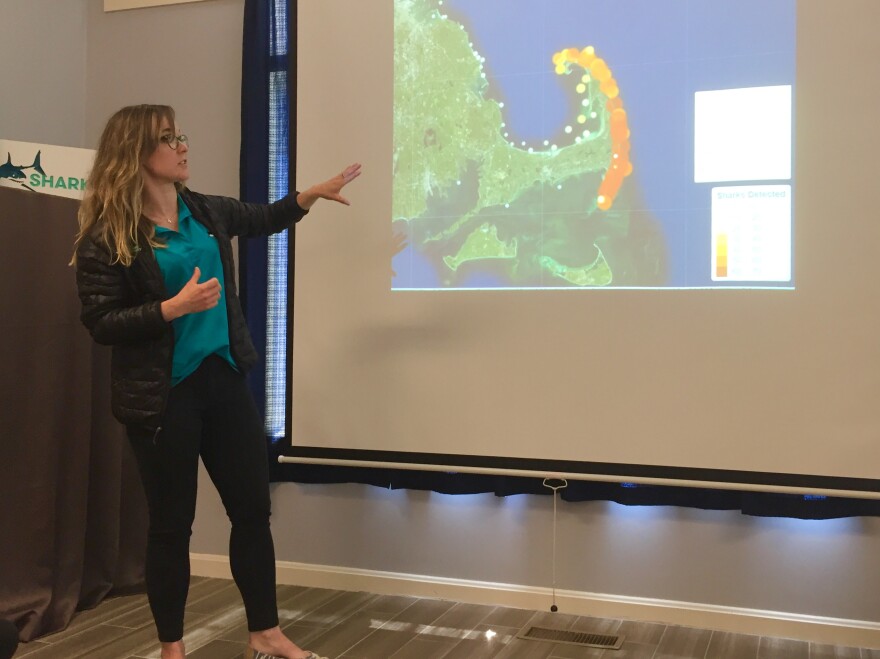As sharks return to Cape Cod for the summer, scientists are testing to new ways to track them

Megan Winton, staff scientist at the Atlantic White Shark Conservancy, explains some of the white shark data collected off Cape Cod. (Jennette Barnes/CAI)
White sharks are arriving in Massachusetts waters for the summer, and researchers who study shark behavior off Cape Cod are testing some new techniques.
State shark biologist Greg Skomal works closely with Megan Winton, staff scientist at the Atlantic White Shark Conservancy. They and other scientists up and down the coast share data from nearly 200 acoustic buoys deployed by several organizations.
Skomal said only five of the buoys in his project provide real-time data, because real-time buoys are so expensive — $16,000 each — and because ocean conditions often damage the internal technology. Each real-time buoy, which feeds data to the Conservancy’s shark-tracking app Sharktivity, uses wifi and cellular systems, solar power, a battery, and more.
He said those elements are fairly simple on their own, but “when you put them all together in a package to withstand a typical nor’easter, that’s the hard part.”
This year, Skomal has received money to test two larger buoys for the real-time equipment, to see if they can better withstand the conditions.
In addition, researchers are studying the effectiveness of drone cameras at spotting sharks.
They’ll fly drones over the beaches and compare the images to acoustic data. The goal is to find out whether drones can spot sharks visually as well as buoys can acoustically.
Water clarity and solar glare could make the drones’ work difficult, Winton said.
“Sometimes the water is so clear it looks like the Caribbean,” she said. “Other times it looks like chocolate milk, and you really can’t see anything. It’s a very dynamic area.”
The number of white sharks detected off Cape Cod by acoustic receivers has risen for eight years in a row.
Last year, 132 individual sharks were detected, up from just 11 in 2013, according to the Atlantic White Shark Conservancy.
But don’t assume the actual number of sharks in the water is rising each year, Skomal said.
“We tag more every year, so that’s going to automatically lead to more detections,” he said. “We also expand our receiver array a little bit each year, or other researchers put receivers in, and we get their data.”
He said that over the last decade, it’s true that the number of white sharks around the Cape has increased. They started coming in larger numbers to feed on the resurgent seal population.
Public attention to white sharks off the Cape has grown since 2018, when a man died from a shark bite off Wellfleet in September. A month earlier, a man was bitten off Truro and gravely injured.
Skomal said shark encounters are most likely to happen along the Outer Cape and on the eastern side of Cape Cod Bay during peak season — August, September, and October.
